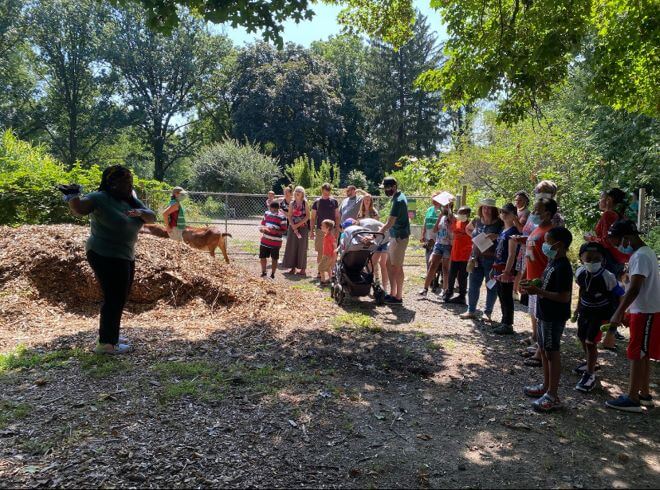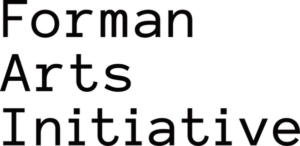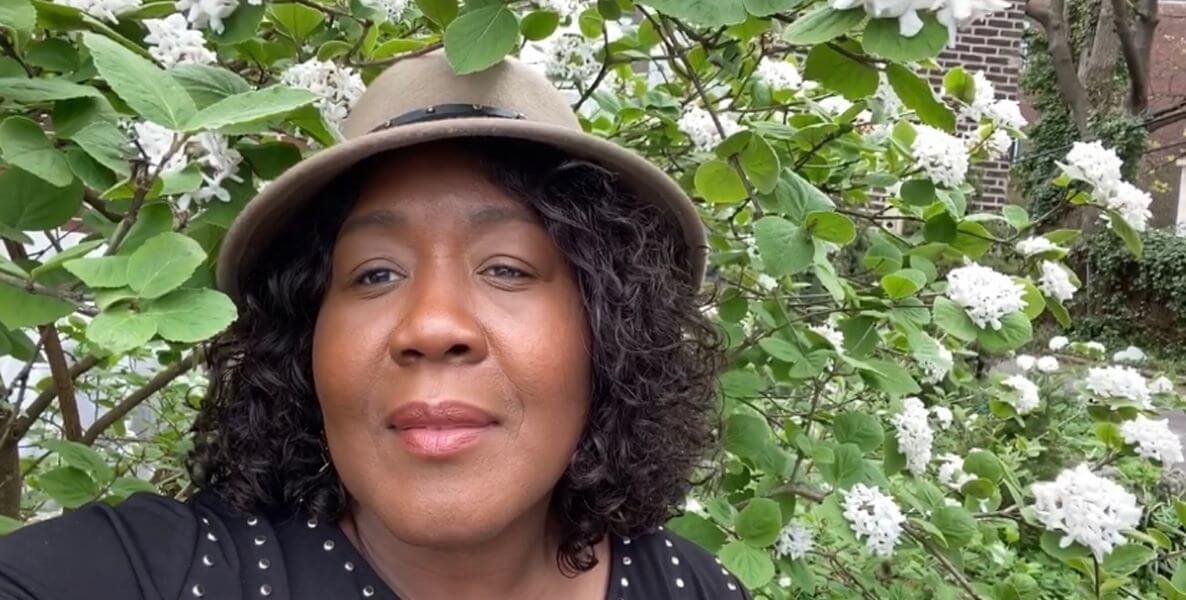Call 1-855-POEMRX2 and Trapeta B. Mayson will answer. That’s the number for Healing Verse Poetry Line, a toll-free phone service offering a new poem about mental wellbeing every Monday. Twenty four-seven and year-round, a recording of Mayson’s voice will direct you to “press 1” for this week’s poem, “press 2” to access mental health resources, or “press 3” to connect directly with the Suicide Prevention Lifeline.
Accompanied by music from Grammy-nominated Jazz guitarist Monnette Sudler, Mayson offers a final reminder: “Remember that poems are healing, too.” Mayson founded the line while serving as the fifth poet laureate of Philadelphia in 2020 to 2021, and the project couldn’t be a more perfect encapsulation of what Mayson stands for — community, advocacy and collaboration.
Mayson, a fellow at Pew, the Academy of American Poets and Aspen Word, is also a licensed social worker and arts educator who is very active in her community of Germantown, with previous roles at the Please Touch Museum, a Kensington mental health agency, and as executive director of Historic Germantown. Born in Liberia, Mayson centers poetry on her own experience as an immigrant, as well as that of others, and reflects on daily experiences.
“I always wanted to do projects that merged poetry with healing, with mental wellness practices. Once I accepted that my clinical/social work career and artistic life seamlessly converged, I stopped trying to keep them separate,” says Trapeta B. Mayson.
On her love for Philadelphia, Mayson told John Wall Barger: “I’ve read in New York many times … I always had the sense that Philly people felt like, in New York they arrived. And I was saddened by that because here in this place, in Philadelphia, the talent is overwhelming. I remember [former Poet Laureate] Yolanda Wisher saying, ‘A hero is never accepted in their own home.’”
On May 1, Mayson and Wisher launched their new collaborative project ConsenSIS “to preserve the past and present literary legacy of Black women poets in Philadelphia” through a survey to gather stories, the prototyping of commemorative historic markers, and hosting a reunion event. The project runs through September 2022, and is one of 10 projects in 10 cities operating in participation with Monument Lab’s public art, memory, and living history project Re:Generation. Follow the project on Instagram @ConsensisPHL!
In partnership with the Forman Arts Initiative, The Citizen reached out to Mayson to find out more about using poetry to build community. This interview has been edited and condensed.
When the Free Library announced you as the fifth Poet Laureate of Philadelphia, you said, “I’m the sum of two continents, two countries, two sets of powerful people: my birth country of Liberia, and my beloved Philadelphia.” How do these two homes shape your perspective?
These two homes have shaped and continue to shape my perspective immensely. I consider myself lucky to have this perspective. It informs my writing and artistic practice, but more importantly, it helps me see the world from a wider lens, from a place of openness and empathy. I also know that although our lives are flavored by experiences, geography, culture, etc., we are similar in many ways.
I want to highlight and amplify the varied stories, the colorful and beautiful as well as the tragic and terrible, and everything in between. My “homes” provide me with a rich reality and backdrop and an urgency to write about it all. It also compels me to honor the stories of everyday awesome people.
Your 2021 poem But there is still life here reflects on isolation and economic devastation from the pandemic, gentrification and art washing in your neighborhood of Germantown. You have lived in the area for 35+ years — how has it changed over time? How has it remained the same?
In some ways, it seems the same old issues have always been here, but through the eyes of a young woman, it looks different. As a teen growing up in Germantown, I was mostly focused on the circumstances around me. I witnessed a bustling avenue, an economic hub, disappear. I saw properties gobbled up by a few well-resourced savvy people with access.
It remains a beautiful green community with people who care about what happens here, but our reality is rising property values and poachers ready to pounce. I’m disheartened by the fact that there is always a meeting or event to address the issues, but rarely does anything come out of it but divisiveness. I feel it’s intentional: This is how communities are dismantled.
I am encouraged by rising voices and actions of community members who have made this place home for generations and who refuse to be moved. The more we work together, the harder it is to break the community.

Healing Verse Poetry Line, originally a one-year project, is now in its second year after finding a new home at Philadelphia Contemporary. Can you share the project’s impetus?
I always wanted to do projects that merged poetry with healing, with mental wellness practices. Once I accepted that my clinical/social work career and artistic life seamlessly converged, I stopped trying to keep them separate. There are natural connections and I decided to use that to enhance and expand both.
The phone line developed out of a conversation I was having with Yolanda Wisher. It became necessary when I started my tenure as poet laureate because this was also the start of the pandemic. I needed to reach people. My artistic practice is embedded in communities and Covid made that difficult to get out there. The phone line provided access. While in the background I had to do heavy planning and coordinating, to the public, it was as easy as picking up a phone and making a call. It was as inclusive as I was going to get and I was pleased that it was embraced by the community. The line is still active thanks to Yolanda and Philadelphia Contemporary.
You frequently collaborate with other artists, such as Yolanda Wisher, jazz guitarist Monnette Sudler and visual artist Karyn Olivier. What does collaboration add to your practice?
When you have the right partners who respect and applaud each other’s artistic practices and experiences, magic can happen. Monnette and Yolanda are two of my closest friends, they are my sisters. We have years of trust and love to build on. They are fierce idea generators and consistent and solid producers of great projects.
“I am encouraged by rising voices and actions of community members who have made this place home for generations and who refuse to be moved. The more we work together, the harder it is to break the community,” says Trapeta B. Mayson.
Karyn is an awesome artist whom I respect and admire. There are many others with whom I’ve had the pleasure of dreaming up and creating cool projects. The common denominator in collaboration is that both (or more) parties have something to offer. There is a balance, a give and take, and that feels equitable. Also, I look to collaborate with people who put time and effort into their practice, who will work hard to deliver quality work, and have fun while doing it. I’ve been blessed to have great partners.
You’re a member of Greene Street Artists Cooperative (GSAC), an artist-owned and -occupied working/living community. Do you have advice for other artists who might be interested in Greene Street’s model?
I would say, make sure you really are interested in living peacefully in a community with other people. Not everyone is equipped to live with others. Our community is lovely in many ways. It’s a vibrant, amazing building and community. The artists living here are acclaimed and accessible. I’ve been a member for over 11 years.
We also have our share of issues. If you want to live in or create a model like GSAC, it’s best not to romanticize the fact that it takes work to truly live with others. If you find that you can’t resolve issues peacefully or you don’t want to compromise or be respectful, it’s not for you. When a model like GSAC works well, we support one another and cheer each other on. We are all different, but we are similar in our desire to live in and among a diverse and inspiring community of artists.
Is there a line or excerpt from any of your poems — new or old — that you’d like to share?
From in this season, a reminder that even our “small” acts can make a difference:
you beloved, may think yourself too small
may think your intentions and acts too slight …
but what a world you are
what a sphere of shocking beauty and grace
do you not see how
your one song one breath one step one voice
your one pause one lift one shout one protest
brought us here, keeps us here?
 This story is part of a partnership between The Philadelphia Citizen and Forman Arts Initiative to highlight creatives in every neighborhood in Philadelphia. It will run on both The Citizen and FAI’s websites.
This story is part of a partnership between The Philadelphia Citizen and Forman Arts Initiative to highlight creatives in every neighborhood in Philadelphia. It will run on both The Citizen and FAI’s websites.
Morgan Nitz (she/they) is a queer interdisciplinary artist and writer in Philly, and the operations & development editor of Philly Artblog. Their work has been shown at The Institute of Contemporary Art, Vox Populi, Pilot Projects, and other venues; they completed a residency at Jasper Studios; and were the co-inaugural curator of Straw, Tyler School of Art’s AV-closet-turned-Alumni-gallery. morgannitz.com | @son_of_m.a.n
![]() MORE STORIES FROM OUR FAI SERIES
MORE STORIES FROM OUR FAI SERIES



